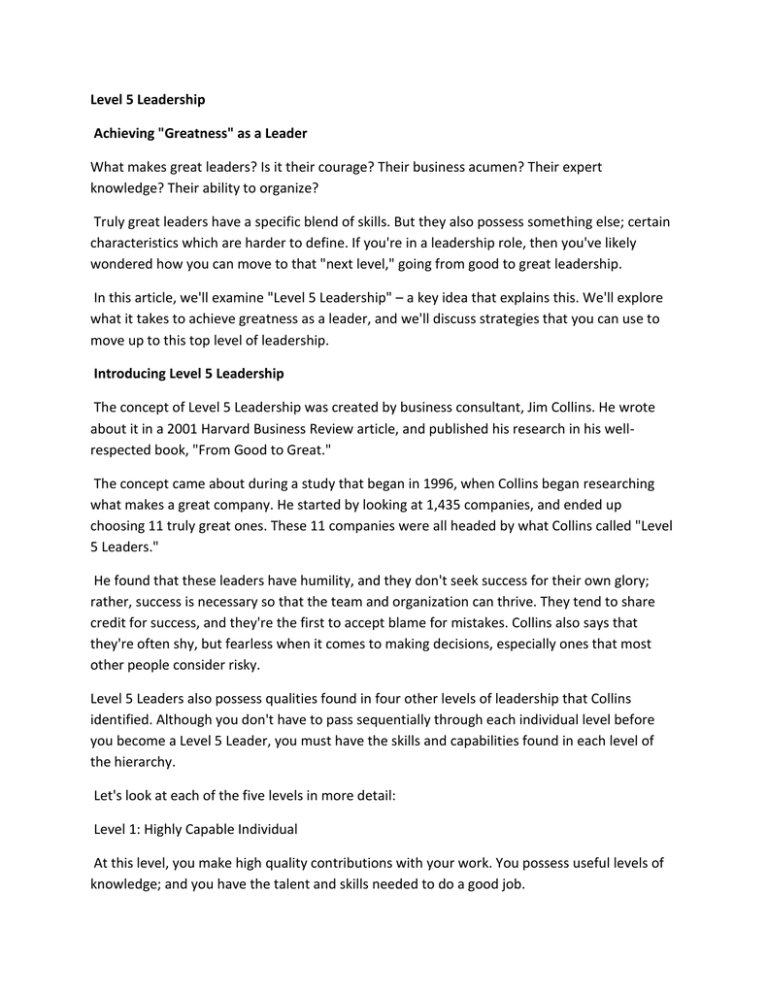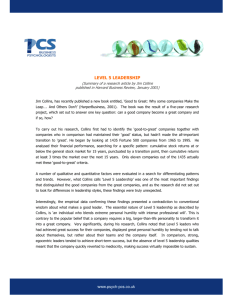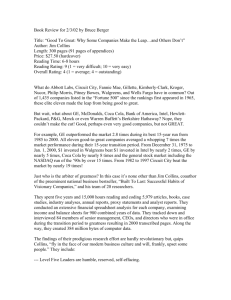Level 5 Leadership
advertisement

Level 5 Leadership Achieving "Greatness" as a Leader What makes great leaders? Is it their courage? Their business acumen? Their expert knowledge? Their ability to organize? Truly great leaders have a specific blend of skills. But they also possess something else; certain characteristics which are harder to define. If you're in a leadership role, then you've likely wondered how you can move to that "next level," going from good to great leadership. In this article, we'll examine "Level 5 Leadership" – a key idea that explains this. We'll explore what it takes to achieve greatness as a leader, and we'll discuss strategies that you can use to move up to this top level of leadership. Introducing Level 5 Leadership The concept of Level 5 Leadership was created by business consultant, Jim Collins. He wrote about it in a 2001 Harvard Business Review article, and published his research in his wellrespected book, "From Good to Great." The concept came about during a study that began in 1996, when Collins began researching what makes a great company. He started by looking at 1,435 companies, and ended up choosing 11 truly great ones. These 11 companies were all headed by what Collins called "Level 5 Leaders." He found that these leaders have humility, and they don't seek success for their own glory; rather, success is necessary so that the team and organization can thrive. They tend to share credit for success, and they're the first to accept blame for mistakes. Collins also says that they're often shy, but fearless when it comes to making decisions, especially ones that most other people consider risky. Level 5 Leaders also possess qualities found in four other levels of leadership that Collins identified. Although you don't have to pass sequentially through each individual level before you become a Level 5 Leader, you must have the skills and capabilities found in each level of the hierarchy. Let's look at each of the five levels in more detail: Level 1: Highly Capable Individual At this level, you make high quality contributions with your work. You possess useful levels of knowledge; and you have the talent and skills needed to do a good job. Level 2: Contributing Team Member At Level 2, you use your knowledge and skills to help your team succeed. You work effectively, productively and successfully with other people in your group. Level 3: Competent Manager Here, you're able to organize a group effectively to achieve specific goals and objectives. Level 4: Effective Leader Level 4 is the category that most top leaders fall into. Here, you're able to galvanize a department or organization to meet performance objectives and achieve a vision. Level 5: Great Leader At Level 5, you have all of the abilities needed for the other four levels, plus you have the unique blend of humility and will that's required for true greatness. How to Become a Level 5 Leader It takes time and effort to become a Level 5 Leader. But the good news is that it can be done, especially if you have the passion to try. Again, it's important to realize that you don't have to progress through each level in turn in order to get to Level 5. But you do need the capabilities found in each level in order to achieve Level 5 status. Here are some strategies that will help you grow emotionally and professionally, so that you can develop the qualities of a Level 5 Leader: Develop Humility Level 5 Leaders are humble people. So, learn why humility is important, and make sure that you understand – at a deep, emotional level – why arrogance is so destructive. Then ensure that you behave in a humble way – for example, whenever your team has success, make sure that credit goes to them for their hard work. Conversely, as a leader, you're responsible for your team's efforts, even when things go wrong. http://www.mindtools.com/pages/article/level-5-leadership.htm



